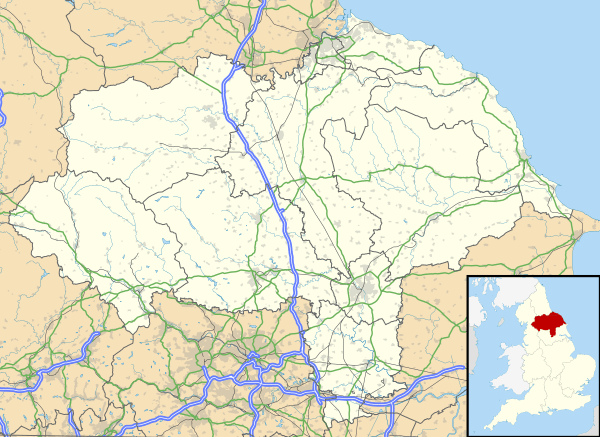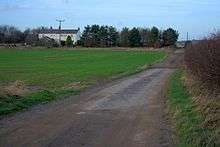Kilton Thorpe
Kilton Thorpe is a village in the borough of Redcar and Cleveland and the ceremonial county of North Yorkshire, England.[1] Noted for evidence of early settlement. The outlines of an ancient village are visible in fields adjacent to the present village.[2]
| Kilton Thorpe | |
|---|---|
 Kilton Thorpe Location within North Yorkshire | |
| OS grid reference | NZ692176 |
| Unitary authority | |
| Ceremonial county | |
| Region | |
| Country | England |
| Sovereign state | United Kingdom |
| Post town | SALTBURN-BY-THE-SEA |
| Postcode district | TS12 |
| Police | Cleveland |
| Fire | Cleveland |
| Ambulance | North East |
The village is mentioned in the Domesday Book as belonging to Count Mortain.[3] Like other lands in the surrounding area, it was owned by the same noble families as those who owned nearby Kilton Castle. It was only a small settlement across two manors until the arrival of the ironstone industry when 30 workers cottages were built.[4][5]

Kilton Mine
Kilton Ironstone Mine was opened in 1875 just to the south of the village of Kilton Thorpe.[6] The shafts of the mine were 700 feet (210 m) deep, and like the other mines in the area, it supplied ironstone to the furnaces on Teesside.[7] A private railway was opened in 1873, becoming the property of the North Eastern Railway a year later.[8]
On 12 August 1899, three miners were killed by an explosion of gas,[9] and on 3 May 1954, an explosion in the mine killed one worker, with 15 rescuers being hospitalised after the event due to the effects of inhaling gas.[10] The mine was closed in January 1963.[11]
A conical shale heap still exists at the site and has become a local landmark, although it has become dangerous through land slips and the owners have taken steps to prevent access by the general public.[12]
References
- Ordnance Survey: Landranger map sheet 94 Whitby & Esk Dale (Robin Hood’s Bay) (Map). Ordnance Survey. 2012. ISBN 9780319228999.
- Historic England. "Medieval settlement and open field system at Kilton Thorpe (1019915)". National Heritage List for England. Retrieved 23 December 2019.
- "[Kilton] Thorpe | Domesday Book". opendomesday.org. Retrieved 23 December 2019.
- "Genuki: Brotton, Yorkshire (North Riding)". www.genuki.org.uk. Retrieved 23 December 2019.
- "Genuki: BROTTON: Geographical and Historical information from the year 1890., Yorkshire (North Riding)". www.genuki.org.uk. Retrieved 23 December 2019.
- "Kilton Mine". nmrs.org.uk. Retrieved 23 December 2019.
- "Dorman Long and Co. Ltd., Ironstone worked from Kilton Mine for half year ending 31 Dec. 1928; Dorman Long and Co. Ltd., Ironstone worked from Mr. Wharton's Royalties for half year ending 31 Dec. 1928; Bolckow Vaughan and Co., Statement of Ironstone drawn from South Skelton Mines for half year ending 31 Dec. 1928; Bolckow Vaughan and Co. Ltd., Ironstone worked from North Skelton Mine for half year ending 31 Dec. 1928". discovery.nationalarchives.gov.uk. Retrieved 23 December 2019.
- Grant, Donald J (2017). Directory of the railway companies of Great Britain. Kibworth Beauchamp: Matador. p. 292. ISBN 978-1785893-537.
- "Local and District". Gale Primary Sources (15, 034). 14 August 1899. p. 4. Retrieved 23 December 2019.
- "Mine Accident, Cleveland - Hansard". hansard.parliament.uk. Retrieved 23 December 2019.
- "Durham Mining Museum - Kilton (Ironstone)". www.dmm.org.uk. Retrieved 23 December 2019.
- Morgan, Mike (6 September 2012). "Steps taken to boost safety at former Kilton Mine site". Gazette Live. Retrieved 23 December 2019.